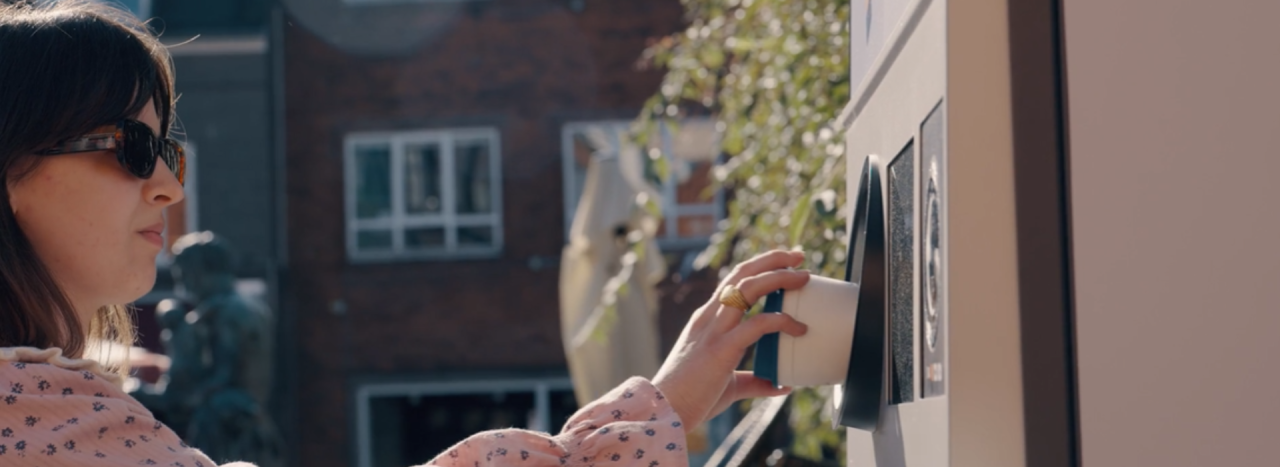Mastercard: Talking Trash: How One Danish City Is Cleaning Up, Cup by Cup
Rhea-AI Summary
The city of Aarhus, Denmark has implemented an innovative deposit return program for reusable drink cups to combat street litter. Since January, the system allows customers to pay a 5-krone deposit for reusable cups, which can be returned through 27 machines across the city. The program, developed in partnership with TOMRA Systems and utilizing Mastercard Move for payments, has introduced 630,000 REUSABLE cups, reducing city waste by 10 tons. With an 88% return rate, the system integrates cashless payments for a seamless user experience. The city plans to expand the program to include reusable containers for food items, serving as a potential model for other cities worldwide.
Positive
- Successful implementation with 88% cup return rate
- Reduced city waste by 10 tons through 630,000 reusable cups
- Integration of Mastercard Move payment system enhances user experience
- Potential for expansion into food container reuse program
Negative
- Higher operational costs compared to single-use products (15 cents vs 70 cents deposit)
- Requires significant infrastructure investment for collection and sanitization
News Market Reaction 1 Alert
On the day this news was published, MA declined 1.33%, reflecting a mild negative market reaction.
Data tracked by StockTitan Argus on the day of publication.
NORTHAMPTON, MA / ACCESSWIRE / November 20, 2024 / Mastercard
By Sophie Hares
Every weekend, as people stumble home from packed bars and clubs in Aarhus, Denmark's second biggest city, they leave behind a messy trail of cups, burger wrappers and pizza boxes, which clog gutters and drift into waterways.

It's a costly problem for the Viking-founded coastal city, which has been looking for ingenious ways to eliminate the takeaway garbage it calculates is responsible for nearly half the litter on its streets.
That's why, since January, the municipality has been testing out an innovative deposit return program for reusable drink cups, the world's first system of its kind, which it hopes will eradicate the millions of single-use cups the city's baristas hand out each year.
Now, each time people order their flat white to go, they can pay a 5-krone (70 cent) deposit for a lidded plastic cup with a blue REUSABLE logo. After their caffeine fix, they can feed their used cup into one of 27 machines dotted around the city to be cleaned and redistributed, and they just tap their phone or card to the machine to get their deposit back.
"Our working vision is a city without waste bins," says Simon Smedegaard Rossau, Aarhus's project manager for circular systems. "It's about turning your thoughts a little bit and being ambitious."
So far this year, the introduction of some 630,000 REUSABLE cups has slashed city waste by about 10 tons, and the trial is popular with the public as well as many small retailers that struggled to find ways to reduce single-use products. Next, Aarhus plans to pilot reusable boxes for sushi, burgers and salads.
The implications of Aarhus's pilot expand far beyond its city limits. Takeaway bags, cutlery, drink containers and wrappers now dominate waterway litter throughout the world and have clogged landfills in some cities. As one response, many governments have banned certain single-use plastics, including bags and plates. As many municipalities grapple with their waste crises, city leaders in countries from Japan to Brazil are closely watching the Danish city to decide it they should follow suit with reusable programs too.
These communities are keenly aware that reusable packaging will not take off unless the business model becomes financially viable. The cost of collection, sanitization, quality inspections and redistribution makes it tricky to undercut the price of single-use products (approximately just 15 cents for each throwaway cup) and scale the program, which can help cities cut their emissions as well as waste management bills.
That's why policies are needed to provide the conditions and incentives to transition to well-designed reuse systems, unlocking their full environmental and economic potential, says Geir Saether, the senior vice president of circular economy for TOMRA Systems, the Norwegian sustainable technology company that partnered with Aarhus to pilot the REUSABLE containers.
TOMRA was able to adapt its existing bottle and can reverse vending machines to accommodate coffee and drinks cups. For consumers who select the more sustainable reuse option, the 5-krone returnable deposit is added to the product purchase. The deposit is an efficient incentive for consumers to return the packaging, ensuring high collection rates, Saether says.
Keen to encourage people to make the extra effort to reuse, they tried to make the process as painless as possible by installing returns machines in busy spots roughly every 500 yards in the pilot area, where 50,000 people live.
Integrating the cashless deposit payments provided by Mastercard Move, the company's near-real-time payments platform that allows people to securely send and receive money via both cards and accounts worldwide, has proven key to creating a much smoother experience for consumers instead of asking them to use clunky apps each time they grab a coffee.
"A solution based on reusable packaging is not as convenient as a solution based on disposable packaging, so at least we should minimize the inconvenience factor," Saether says.
Highlighting Lisbon's plastic cup ban and Dubai's move to prohibit all single-use plastic packaging, Saether says measures such as taxes or restrictions on disposable products would encourage stronger take-up of reusable systems. It's a consideration that could determine if countries or cities choose to introduce broader policies to encourage using similar sustainable alternatives.
Nearly a year into the trial, Rossau says he's seeing less litter around Aarhus as
If the three-year trial works in a compact city like Aarhus, it could be scaled up to densely populated cities such as New York, if they can find spots to install the thousands of reverse vending machines they would need.
"We need to make a mature choice to say we need to take a little bit of space here and there to minimize the growing waste crisis we're seeing in all cities," Rossau says. "If you're a city official, you need to ask yourself otherwise, 'Where are we going to put all this waste that's overflowing our streets?'"
Originally published by Mastercard
View additional multimedia and more ESG storytelling from Mastercard on 3blmedia.com.
Contact Info:
Spokesperson: Mastercard
Website: https://www.3blmedia.com/profiles/mastercard
Email: info@3blmedia.com
SOURCE: Mastercard
View the original press release on accesswire.com









